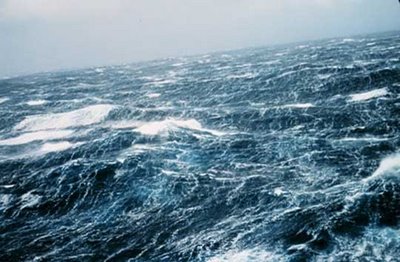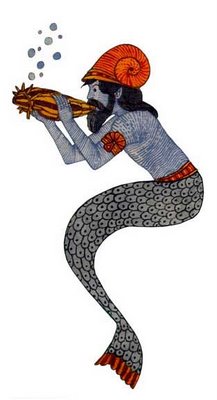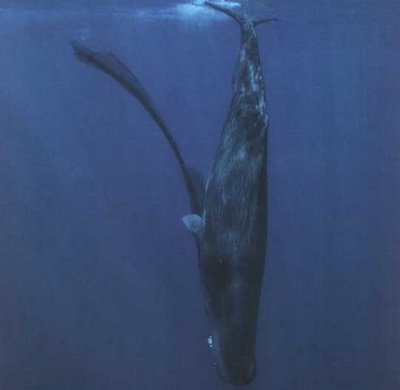The Phantom Tide

An ancient will ordains
these sweeping motions
across and down the page,
bidding me complete the
breviary tossed in the drink
when You cried Your name
at last, so many ages ago,
a name I’ll sound today,
perhaps tomorrow. Ocean
scholars give me precedent.
Deep-water waves tide
dark and cold huge masses
of Your blue, a feral undulation
which tropes my every thrall,
sweeping my beloved into view
and then erasing her in
ebbing foam and hiss from
every shore we shared
in the deadest hours of the night.
Related to that black tide
and still relative to this
wave-seeming script,
a living cloud of depth
has been found to thrive
down all basins of the sea,
a “phantom bottom” which
rises by night -- perhaps to
feed -- and falls far down
by day. Some vast appetite
rides that deepest tide,
the tide, each revered in
the other, both revealing
in this poem a world-deep
manta’s wings whose
every heave I sigh.
Such motions in the
sea are new only to
me, but knowing them
has somehow altered
the sea’s influence
upon the mind which
wades offshore to
soak and praise and dream
its depths. Aware now
that my bluer inclinations
are ripped by deep tides
and abyssal wings,
my ocean sense of things
grow freer, released more
leagues from the land-locked
man I was. Love’s waters
baptised me into a realm
never quite solid or
solitary again; and now
in love’s maturity
I sense something deeper
and wilder in its Yes,
valved through the
brinous heart of God
cathedralled undersea.
Each time I write lines
down I’m less the one
who writes the words
as that wave rider
whose known saddle
is dissolving down,
ink on paper glossing
cock in cunt, that
hot mash hurling
in its smash a deep
diviner & far colder
water, thrown
from distances and
depths no words
have yet to name
but might. I just keep
writing down as You
bid me to, salt master,
hurling these radar
bounces of bright
noise from one singing
mouth to all that
sings enormously below.
Here’s evidence that
desire and its pains
ghost wet topograhpies
of a far greater beast
who swims below
those massy whales
we’ve damn near killed
the last of. True singing
is the barb I can’t
throw deep enough,
far under the lowest
plunging throb and ache,
the sweetest blackest pour
of all inside love’s forever
drowning breasts.
A gust of tidal curve,
that long collapsing boom
which welcomes the next
room I’ll wake to write
about. It’s 4:30 a.m. -- at
that cusp of night and day --
sprinklers whirring in
the garden & an ambulance
with whirling white
and red bright lights
headed up to the
adult care facility
on the next block where
someone’s giving up
Your ghost. Our cat
on the couch staring
at me with eyes of lidded
pure blue, wondering
if I’ll get it yet, if I ever will.
I call her name softly over
and again: she bats her
eyes, then sinks to sleep.

“There is, then, no water that is wholly of the Pacific, or wholly of the Atlantic, or of the Indian or the Antarctic. The surf that we may find exhilarating at Virginia Beach or at La Jolla today may have lapped at the base of Antarctic icebergs or sparkled in the Mediterranean sun, years ago, before it moved through dark and unseen waterways to the place we find it now. It is by the deep, hidden currents that the oceans are made one.”
— Rachel Carson, The Sea Around Us
***
The recent discovery that a living cloud of some unknown creatures is spread over much of the ocean at a depth of several hundred fathoms below the surface is the most exciting thing that has been learned about the ocean in many years.
When echo sounding was developed to allow ships while under way to record the depth of the bottom, probably no one suspected that it would also provide a means of learning something about deep-sea life. But operators of the new instruments discovered that sound waves, directed downward from the ship like a beam of light, were reflected back from any solid object they met. Answering echoes were returned from intermediate depths, presumably from schools of fish, whales, or submarines, then a second echo was received from the bottom.
... In 1946 ... the United States Navy issued a significant bulletin. It was reported that several scientists, working with sonic equipment in deep water of the California coast, had discovered a widespread ‘layer’ of some sort, which gave back an answering echo to the sound waves. This reflecting layer, seemingly suspended between the surface and the floor of the Pacific, was found over an area 300 miles wide. It lay from 1000 to 1500 feet below the surface. The discovery was made by three scientists, Eyring, Christensen, and Raitt, aboard the USS Jasper in 1942, and for a time this mysterious phenomenon, of wholly unknown nature, was called the ECR layer.
Then in 1945 Martin W. Johnson, marine biology of the Scripps Institution of Oceanography, made a further discovery which gave the first clue to the nature of the layer. Working aboard the vessel E.W. Scripps, Johnson found that whatever sent back the echoes moved upward and downward in rhythmic fashion, being found near the surface at night, in deep water during the day. This discovery disposed of speculations that the reflections came from something inanimate, perhaps a mere physical discontinuity in the water, and showed that the layer is composed of living creatures capable of controlled movement.
From this time on, discoveries about the sea’s ‘phantom bottom’ came rapidly. With widespread use of echo-sounding instruments, it has become clear that the phenomenon is not something peculiar to the coast of California alone. It occurs almost universally in the deep ocean basins -- drifting by day at a depth of several hundred fathoms, at night rising to the surface, and again, before sunrise, sinking into the depths.
— Rachel Carson, The Sea Around Us
MANTA WINGS
2002
Sleep is a dark manta
sweeping blue floors,
a wild clench
I re-compose
in paper forays
through chapel doors
flapping white wings
toward you God or
the world.
Spread pages inscribe
fling furrow imbibe
lines I can’t master
though each surely wrings
some ichor of that angel
who flew all night
to harrow this day.
ENTER THE DRAGON
Jan 2005
The Dark — felt beautiful.
— Emily Dickinson (Fr. 627)
Beware the scented bed of
Love: it rides upon the
dragon’s back who swims
abyssal realms. Drowse
there and you’ll wake
a molted man of fire,
enrapt inside the rupture
of the devil of deep
welcome. Your wings
will lift you into nights
the size of titan ire,
your eyes whet and keen
for any trace of blue
embroilment to fall,
silklike, from yet
knowable breasts
ripe and leaking
dragon’s milk, booze
poured from paps
of doom. Ride such
nights at your peril,
son of ancient smiles:
Do not presume you
have tooth or troth
sufficient for that dark
demanding angel ride
into the chasm which
splits the fundaments.
Just hold on for your
immortal soul
and let heavens collide
and smash down
every shore. Let every
numen reveal the bestial
depths below, like buoys
singing on blackened tides,
rippled by deep waves
fanning deeper lands
than undreamt Love can go.

DEEP WAVE RIDER
Jan. 24, 2006
Deep waves stroll the oceans
unseen to all surfaces
on the cold wings of abyss,
a visceral tow glowing
with the gules of minerals
torn from the paps of hell.
He rides those waves too,
my fish-familiar, in this
songlike totem I ride here,
his salty ancient brogue
still rich on my tongue
after a thousand mortal
spans. I on a fish which
masts deep waves is
what makes the music
so hugely dark, opaque
and fell, a buckaroo’s derange
in Moby’s wake
where shattered hulks
and eerie churchbells
fan by too fast and dim
to hearken, much less name,
and life is pure Silurian,
a swarm of sharks and jellyfish
and trilobites about the
same matins now for a half
billion years. That infernal choir
lifts the base note I here sound,
my vox humana the highest
ache of jism and jawing
egg, the hot rush of futurity
which forever lives the
next day with ravenous teeth
in a gale of sweet-torn flesh.
Just what song is it, I
wonder, rolling three miles
beneath my saddle? What
beast of lyric hooves so wild
and regal blue as to make all
depths divine, be they in
my words or in the sea or in
the angel’s fall between
us who limns the barrows
of all lost gods. From trough
to crest I clasp my knees
to waves as tall as Pyranees
yet never crash on shores
my love will ever see,
as if love’s shout of pure
liquidity was never meant
for beds or beaches or
the dry breeches of songs
about love, rather than
the ones all depths love.
Primal as to drown
the dreams of shamans
etched on walls not seen
in ten thousand years,
this music is old, it was
lifted pure up to God
when men and beasts
were one, brother and
familiar, both in the
maw of appetite and
the stellar foam of lust,
both in the other so
vastly that whole
caverns failed to harrow
the rituals of rebirth
into the womb which
birthed us all.
Perhaps that’s why
I’m here on the biggest
waves no human eyes
can see, yeehawing
to high heaven on
thalassas of brine joy,
lurching and lifting
up to crown Manannan’s
thrall, wilding all the
way down here where
Uranos parked his balls
in a mess of Venusian
cream. When I’m on my
beast we lord the waves
which rock and roll the seas —
the boy astride his guitar
of a cock of fish of a pen,
come at last to gig
the big night music,
power—chording deep
waves like shouts of
whales between beneath
and past all shores.

THE HONOR AND GLORY OF WHALING
Herman Melville, Moby-Dick
Chapter lxxxii
There are some enterprises in which a careful disorderliness is the true method.
The more I dive into this matter of whaling, and push my researches up to the very spring-head of it, so much the more am I impressed with its great honorableness and antiquity; and especially when I find so many great demi-gods and heroes, prophets of all sorts, who one way or other have shed distinction upon it, I am transported with the reflection that I myself belong, though but subordinately, to so emblazoned a fraternity.
The gallant Perseus, a son of Jupiter, was the first whaleman; and to the eternal honor of our calling be it said, that the first whale attacked by our brotherhood was not killed with any sordid intent. Those were the knightly days of our profession, when we only bore arms to succor the distressed, and not to fill men’s lamp-feeders. Every one knows the fine story of Perseus and Andromeda; how the lovely Andromeda, the daughter of a king, was tied to a rock on the sea-coast, and as Leviathan was in the very act of carrying her off, Perseus, the prince of whalemen, intrepidly advancing, harpooned the monster, and delivered and married the maid. It was an admirable artistic exploit, rarely achieved by the best harpooneers of the present day; inasmuch as this Leviathan was slain at the very first dart. And let no man doubt this Arkite story; for in the ancient Joppa, now Jaffa, on the Syrian coast, in one of the Pagan temples, there stood for many ages the vast skeleton of a whale, which the city’s legends and all the inhabitants asserted to be the identical bones of the monster that Perseus slew. When the Romans took Joppa, the same skeleton was carried to Italy in triumph. What seems most singular and suggestively important in this story, is this: it was from Joppa that Jonah set sail.
Akin to the adventure of Perseus and Andromeda - indeed, by some supposed to be indirectly derived from it - is that famous story of St. George and the Dragon; which dragon I maintain to have been a whale; for in many old chronicles whales and dragons are strangely jumbled together, and often stand for each other. “Thou art as a lion of the waters, and as a dragon of the sea,” saith Ezekiel; hereby, plainly meaning a whale; in truth, some versions of the Bible use that word itself. Besides, it would much subtract from the glory of the exploit had St. George but encountered a crawling reptile of the land, instead of doing battle with the great monster of the deep. Any man may kill a snake, but only a Perseus, a St. George, a Coffin, have the heart in them to march boldly up to a whale.
Let not the modern paintings of this scene mislead us; for though the creature encountered by that valiant whaleman of old is vaguely represented of a griffin- like shape, and though the battle is depicted on land and the saint on horseback, yet considering the great ignorance of those times, when the true form of the whale was unknown to artists; and considering that as in Perseus’ case, St. George’s whale might have crawled up out of the sea on the beach; and considering that the animal ridden by St. George might have been only a large seal, or sea-horse; bearing all this in mind, it will not appear altogether incompatible with the sacred legend and the ancientest draughts of the scene, to hold this so-called dragon no other than the great Leviathan himself. In fact, placed before the strict and piercing truth, this whole story will fare like that fish, flesh, and fowl idol of the Philistines, Dagon by name; who being planted before the ark of Israel, his horse’s head and both the palms of his hands fell off from him, and only the stump or fishy part of him remained. Thus, then, one of our own noble stamp, even a whaleman, is the tutelary guardian of England; and by good rights, we harpooneers of Nantucket should be enrolled in the most noble order of St. George. And therefore, let not the knights of that honorable company (none of whom, I venture to say, have ever had to do with a whale like their great patron), let them never eye a Nantucketer with disdain, since even in our woollen frocks and tarred trowsers we are much better entitled to St. George’s decoration than they.
Whether to admit Hercules among us or not, concerning this I long remained dubious: for though according to the Greek mythologies, that antique Crockett and Kit Carson - that brawny doer of rejoicing good deeds, was swallowed down and thrown up by a whale; still, whether that strictly makes a whaleman of him, that might be mooted. It nowhere appears that he ever actually harpooned his fish, unless, indeed, from the inside. Nevertheless, he may be deemed a sort of involuntary whaleman; at any rate the whale caught him, if he did not the whale. I claim him for one of our clan.
But, by the best contradictory authorities, this Grecian story of Hercules and the whale is considered to be derived from the still more ancient Hebrew story of Jonah and the whale; and vice versa; certainly they are very similar. If I claim the demigod then, why not the prophet?
Nor do heroes, saints, demigods, and prophets alone comprise the whole roll of our order. Our grand master is still to be named; for like royal kings of old times, we find the headwaters of our fraternity in nothing short of the great gods themselves. That wondrous oriental story is now to be rehearsed from the Shaster, which gives us the dread Vishnoo, one of the three persons in the godhead of the Hindoos; gives us this divine Vishnoo himself for our Lord; - Vishnoo, who, by the first of his ten earthly incarnations, has for ever set apart and sanctified the whale. When Brahma, or the God of Gods, saith the Shaster, resolved to recreate the world after one of its periodical dissolutions, he gave birth to Vishnoo, to preside over the work; but the Vedas, or mystical books, whose perusal would seem to have been indispensable to Vishnoo before beginning the creation, and which therefore must have contained something in the shape of practical hints to young architects, these Vedas were lying at the bottom of the waters; so Vishnoo became incarnate in a whale, and sounding down in him to the uttermost depths, rescued the sacred volumes. Was not this Vishnoo a whaleman, then? even as a man who rides a horse is called a horseman?
Perseus, St. George, Hercules, Jonah, and Vishnoo! there’s a member-roll for you! What club but the whaleman’s can head off like that?


<< Home